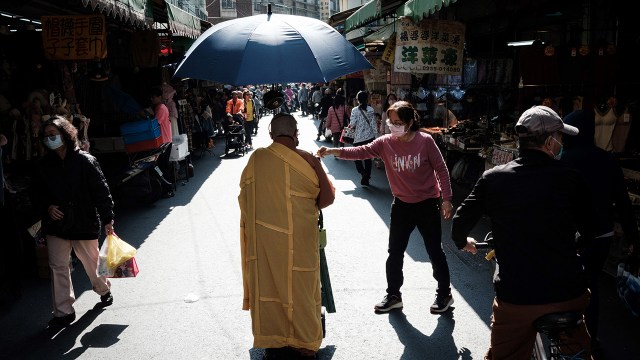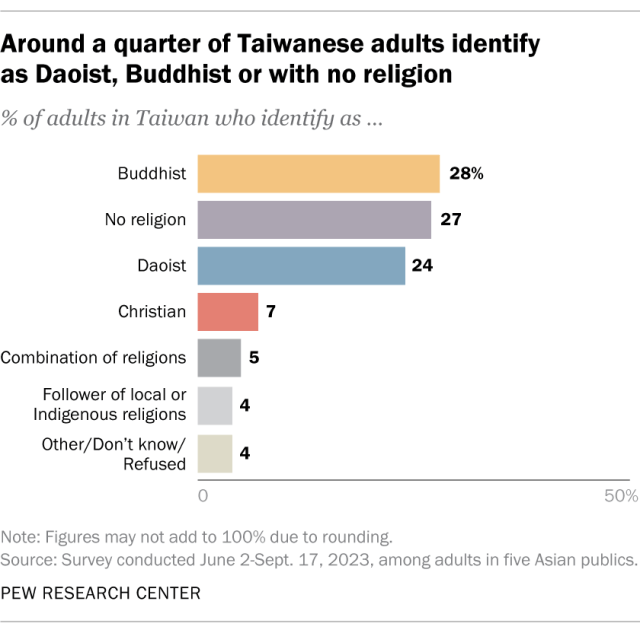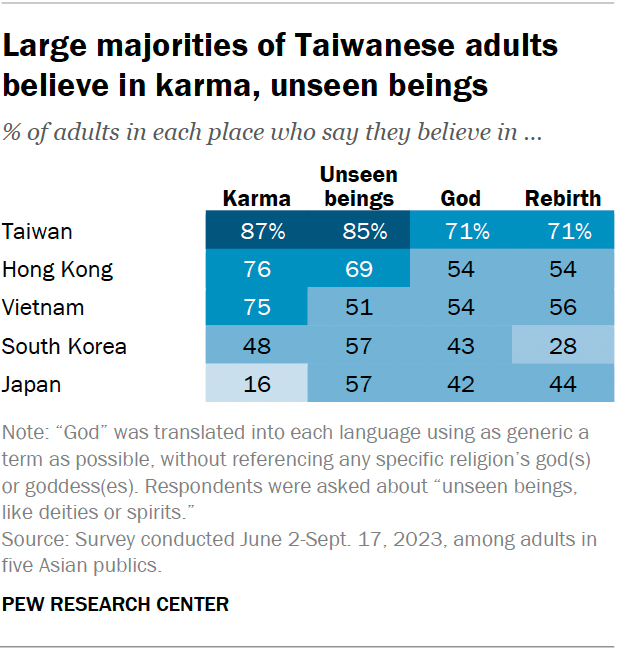
Taiwanese adults practice many religions, and about equal shares of adults there identify with each of the three most popular religious identities. A decade ago, a Pew Research Center analysis found that Taiwan was one of the most religiously diverse places in the world, second only to Singapore.
Our 2023 survey of East Asia and Vietnam offers some insight into how this diversity manifests in Taiwan. Here are four key findings about Taiwan’s distinct position in the region’s religious landscape.
Pew Research Center conducted this analysis to assess religious diversity and beliefs in Taiwan.
The data comes from a Center survey of 10,390 adults in five places: Hong Kong, Japan, South Korea, Taiwan and Vietnam. Interviews were conducted over the phone in the first four places. In Vietnam, interviews took place face-to-face. All surveys were conducted from June 2 to Sept. 17, 2023.
These surveys are part of the Pew-Templeton Global Religious Futures project, which analyzes religious change and its impact on societies around the world.
Respondents were selected using a probability-based sample design. Data was weighted to account for different probabilities of selection and to align with demographic benchmarks for the adult populations.
For more information, read the survey’s full list of questions and responses and our survey methodology.
Buddhists, the religiously unaffiliated and Daoists (also spelled Taoists) each make up about a quarter of Taiwan’s adult population. These are the most common religious identities in Taiwan. Smaller shares of around 5% each identify with Christianity, local or Indigenous religions, or with a combination of religions.

Eight-in-ten Taiwanese adults say that many religions can be true. This is a higher share than in the other four places we surveyed in 2023: Hong Kong, Japan, South Korea and Vietnam. Just 8% in Taiwan say there is only one true religion.
In addition, two-thirds of Taiwanese feel a “personal connection” to at least one tradition besides their own. For example, while only 4% of Taiwanese adults identify as a follower of local or Indigenous religions, 53% say they feel a personal connection to those ways of life.
People in Taiwan are consistently more likely than those in the other places surveyed to express spiritual or religious beliefs. For instance, 87% of people in Taiwan believe in karma, compared with 48% in South Korea.

The beliefs we asked about come from a variety of traditions and are popular across religious groups in Taiwan. For instance, karma has deep roots in Buddhism, and 96% of Taiwanese Buddhists believe in it. But most Taiwanese Christians (64%) also say they believe in karma.
Many adults in Taiwan also view themselves as living in a world of spirits. An overwhelming majority of Taiwanese adults (85%) believe in unseen beings, like deities or spirits. And most (59%) believe that mountains, rivers or trees can have their own spirits.
About a fifth of all Taiwanese adults (21%) have switched away from Daoism since their childhood. On the other hand, 3% were not raised Daoist but identify as such today. As a result, 42% of Taiwanese adults say they were raised Daoist, but only 24% currently identify as Daoist. This level of religious switching is relatively high, just as it is across the region.
Despite the decline in the Daoist population, Taiwan remains the only place in the world that the Center surveys that has a large enough number of Daoists to analyze their beliefs and practices separately from other groups.
Daoism is an ancient set of philosophical and religious beliefs that originated in China over 2,000 years ago. Daoist traditions emphasize the relationship between humans and nature, as well as honoring one’s ancestors, and they include a pantheon of deities and spirits.
Our 2023 survey finds that Daoists in Taiwan overwhelmingly believe in karma (92%), fate (89%) and miracles (87%). Most also believe in rebirth, heaven and hell. Large majorities say they visit shrines or temples or pagodas, and 60% have an altar in their home. All of these shares are higher than the shares for Taiwanese adults who are not Daoist.
Note: For more information, read the survey’s full list of questions and responses and our survey methodology.
